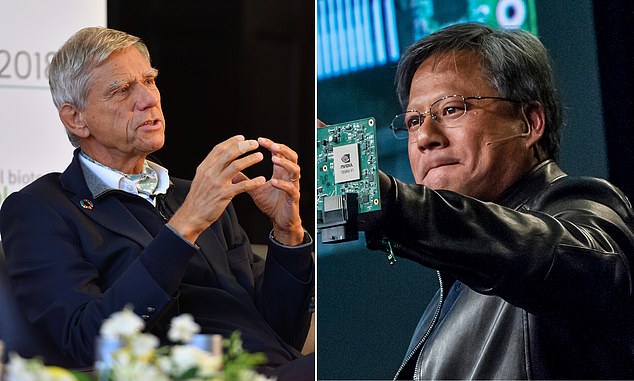We won’t grab tax haul from £31bn tech giant says US buyer: Nvidia hits out at bid to block Arm deal – amid fears that Treasury may be denied millions
The American software giant buying Britain’s biggest technology company is willing to make legally-binding commitments to keep its tax revenues in the UK, The Mail on Sunday can reveal.
Nvidia, which is buying Cambridge-based chip designer Arm in a controversial £31billion deal, makes vast profits outside the US but only pays a tiny fraction in taxes.
Analysis by the think-tank Tax Watch found that Nvidia paid taxes worth just 3 per cent of the $6.15billion (£4.76billion) in profits it has made overseas since 2015.

Almighty row: Nvidia’s Jensen Huang (right) and Arm co-founder Hermann Hauser
High-profile critics of the Arm deal this weekend raised serious concerns that Nvidia could try to shift hundreds of millions of pounds of tax out of Britain by using its international structure.
Arm paid £268million in tax last year, mostly in the UK.
Its co-founder Hermann Hauser told The Mail on Sunday that if Nvidia moved Arm’s tax base out of the UK, the Treasury could miss out on even larger receipts in future because Arm has the potential to become Britain’s first $1trillion company.
Hauser – who has written an open letter to the Prime Minister urging him to intervene in the deal – said: ‘If Arm becomes a division of Nvidia the accounts will be consolidated and they’ll play the usual tricks of all the tax transfer and the tax loopholes that all the big American companies are playing.
‘I’m not accusing them of doing anything illegal – I’m just accusing them of being unethical and immoral.’
Former business secretary Sir Vince Cable – another critic of the takeover – said it would ‘add insult to injury’ if Nvidia shifted Arm’s taxes abroad.
Last night Nvidia hit back at the criticisms and strongly insisted it would not move Arm’s taxes out of the UK to limit its bill.
In a statement, an Nvidia spokesman said: ‘This deal won’t change how Arm pays taxes in the UK.
‘Nvidia will keep Arm’s headquarters, IP [intellectual property] and R&D [research and development] activity in the UK, and will gladly guarantee that with legally binding commitments.
‘That means Arm’s UK profits after the acquisition will continue to be taxable in the UK as they are today.’
Arm designs chips that are used in most smartphones, computers and tablets.
Critics fear for jobs across the UK and are concerned that the US government could in future limit the sale of Arm’s chips to other customers. There are also fears Nvidia will try to limit the sale of Arm’s technology to customers that compete with it.
The UK Government has yet to comment on whether it will block the deal or impose strict conditions. Ministers are likely to be concerned about Nvidia’s tax affairs after criticising the low UK taxes paid by other US tech giants, including Google and Amazon.
Last year, countries outside the US accounted for more than three-quarters of Nvidia’s total profits at $2.35billion. But the firm paid just $103million in taxes on that profit – effectively a tax rate of 4.4 per cent.
The effective tax rate for its US business last year was far higher at nearly 11 per cent.
Nvidia said in its annual report that its overall tax rate is low because of profits banked in low-tax jurisdictions such as the British Virgin Islands, a renowned tax haven, and Hong Kong. This is the type of tax regime Hauser fears Arm would be brought under if the deal goes through, potentially depriving the UK taxpayer of valuable revenue.
Arm, a former FTSE 100 company, was bought in 2016 by Japanese investment giant SoftBank, which has been selling off assets it owns amid financial troubles.
That 2016 deal came shortly after the UK voted for Brexit and tested Theresa May’s resolve on foreign takeovers.
The deal was waved through on the condition SoftBank signed undertakings to double the number of UK employees and keep the headquarters in Cambridge.
But while SoftBank has kept to its promises and treated Arm as an investment, critics of the new deal fear Nvidia’s ownership will be different.
They argue that when Arm becomes a subsidiary of Nvidia, the US company will limit Arm’s global capability to hurt its rivals.
Hauser – who is sending his letter directly to Boris Johnson this week – urged Nvidia boss Jensen Huang to give legally binding commitments that it will not stop Arm from licensing its technology to competitors, but he is not hopeful.
Hauser wants SoftBank to float Arm on the London Stock Exchange instead, with the Government investing up to £2 billion to take a stake.
He said that if this happens Arm can be the foundation for Britain’s first trillion-dollar company, referring to the plan by the Prime Minister’s chief adviser Dominic Cummings to create a trillion-dollar tech giant to match the likes of Apple and Google.
‘If ever there was an industrial strategy to create the first trilliondollar company in the UK, it must start with Arm, which has a dominant position in the IoT [internet of things] and the smartphone space,’ said Hauser, adding that it could combine with other British semiconductor companies such as Graphcore.
He added: ‘For once, we’ve got a full house of cards here to make an industrial strategy out of. This is the time to act to build Britain’s first trillion-dollar company.’
